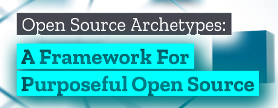Open source is a broad term that encompasses many different types of projects. There is a wide range of open source approaches, and sometimes it helps to think through how your open source approach matches your goals, resources, and environment. In many places we look, we see open source used as a catch-all term to refer to every project. We don't have a common vocabulary to discuss open source in ways that take account of important differences.
OTS prepared a field guide to open source project archetypes with Mozilla that is a first step in addressing that problem. The report catalogs a number of open source archetypes we observe around the community. OTS and Mozilla have found these archetypes to be a useful resource when crafting strategy, weighing tradeoffs, and committing support to open source endeavors. Today, we share the results of this work with the community.
[embed]https://youtu.be/Lo61OOi8_4Y[/embed]
We hope it is useful to you as you design open source initiatives, weigh tradeoffs in strategy, and pick metrics to track success. The archetypes we list are useful comparison points for anybody trying to maximize the benefits of their open source investment.
You can download the report here. Mozilla blogged about it. We also put the source text on GitHub and are inviting contributions to future versions. Finally, please drop us a line at archetypes AT opentechstrategies.com if you have comments.

